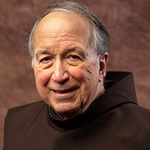Protomartyrs of the Order - St. Berard and Four Friar Companions

On January 16, Franciscans celebrate the feast of St. Berard and four friar companions, the first martyrs of the Order, who were beheaded in Morocco on this date in 1220.
At the general chapter of the Friars Minor in 1219, the decision was made to send brothers to preach the Gospel in Muslim lands—this at a time when the Church was engaged in what was known as the "Fifth Crusade." While Francis himself and a dozen other friars went east to the Holy Land, Berard and five other friars, Peter, Otho, Vitalis, Accursius, and Adjutus, were sent west, to territories ruled by the Almohad caliphate in Southern Spain and Morocco.
Little is known about the previous background of these friars; Berard, a native of Umbria, was the only one who knew Arabic. When they reached Aragon, Vitalis, the leader of the expedition, fell ill; he begged the other friars to continue without him under Berard's guidance. After visiting Portugal, they crossed into Muslim territory and headed for Seville. There Berard and his companions took a bold, confrontational approach in their preaching, calling their hearers to convert – even though any attempt on the part of Christians to evangelize in a Muslim land was considered blasphemy, carrying a penalty of death.

Both the Muslim rulers and local Christians in Seville thought the friars' approach was insane and tried to dissuade them from preaching in this fashion. After admonishing them, however, the ruler of Seville, seeing they were still convinced of their mission, let them go on to Morocco. There too the friars continued to characterize Mohammed as a false prophet; finally, in Marrakesh the caliph Yusuf II had them tortured; afterward, he tried to induce them to embrace Islam, but the friars remained steadfast. Enraged, the young caliph personally beheaded them with a scimitar. The bodies of the martyrs were ransomed and brought to Coimbra, Portugal; moved by this event, a young Portuguese religious was moved to join the Franciscans. He would become famous as Anthony of Padua.

Francis is said to have exclaimed, on hearing of their death: “Now I can truly say that I have five real Lesser Brothers.” We do not know the reason these brothers felt impelled to take this seemingly suicidal approach in their preaching: was it a desire to follow Christ, boldly proclaiming the truth of the Gospel even in the face of opposition? We do know that in light of his own experience of going among Muslims, Francis in 1221 would include the following prescription in the earlier version of the Rule of the Friars Minor, encouraging his brothers to first take a path of humble presence, and to preach openly only when they saw it was opportune (chapter 16):
"As for the brothers who go, they can live spiritually among the Saracens and nonbelievers in two ways. One way is not to engage in arguments or disputes but to be subject to every human creature for God’s sake and to acknowledge that they are Christians. The other way is to announce the Word of God, when they see it pleases the Lord, in order that [unbelievers] may believe in almighty God, the Father, the Son and the Holy Spirit, the Creator of all, the Son, the Redeemer and Savior, and be baptized and become Christians because no one can enter the kingdom of God without being reborn of water and the Holy Spirit (Jn 3:5). . . ."
"And wherever they may be, let all my brothers remember that they have given themselves and abandoned their bodies to the Lord Jesus Christ. For love of Him, they must make themselves vulnerable to their enemies, both visible and invisible, because the Lord says: Whoever loses his life because of me will save it in eternal life. (Lk 9:24 Mt 25:46)."
It is interesting to note that these protomartyrs were not canonized until 1481, a time of heightened tensions between Western Christians and Muslim nations.

The five Franciscan protomartyrs as depicted several decades after their canonization in 1481 by Bernardino Licinio (1524). Franciscan Church of Santa Maria Gloriosa (Frari), Venice.
Cover image: Franciscan protomartyrs of Morocco. Machado de Castro National Museum, Coimbra (Portugal).
Dominic Monti, OFM
Professor of Franciscan Research in the Franciscan Institute of St. Bonaventure University
Dominic V. Monti, OFM, is a Franciscan Friar of Holy Name Province (USA) and currently professor of Franciscan Research in the Franciscan Institute of St. Bonaventure University. He devoted the greater part of his ministry to teaching the History of Christianity, in particular the history of the Franciscan movement. He has contributed two volumes to the Works of St. Bonaventure series and is author of Francis & His Brothers, a popular history of the Friars Minor.

